11 Vegetable Poisons: What Vegetables Are Poisonous When Eaten Raw or Have Poisonous Parts.
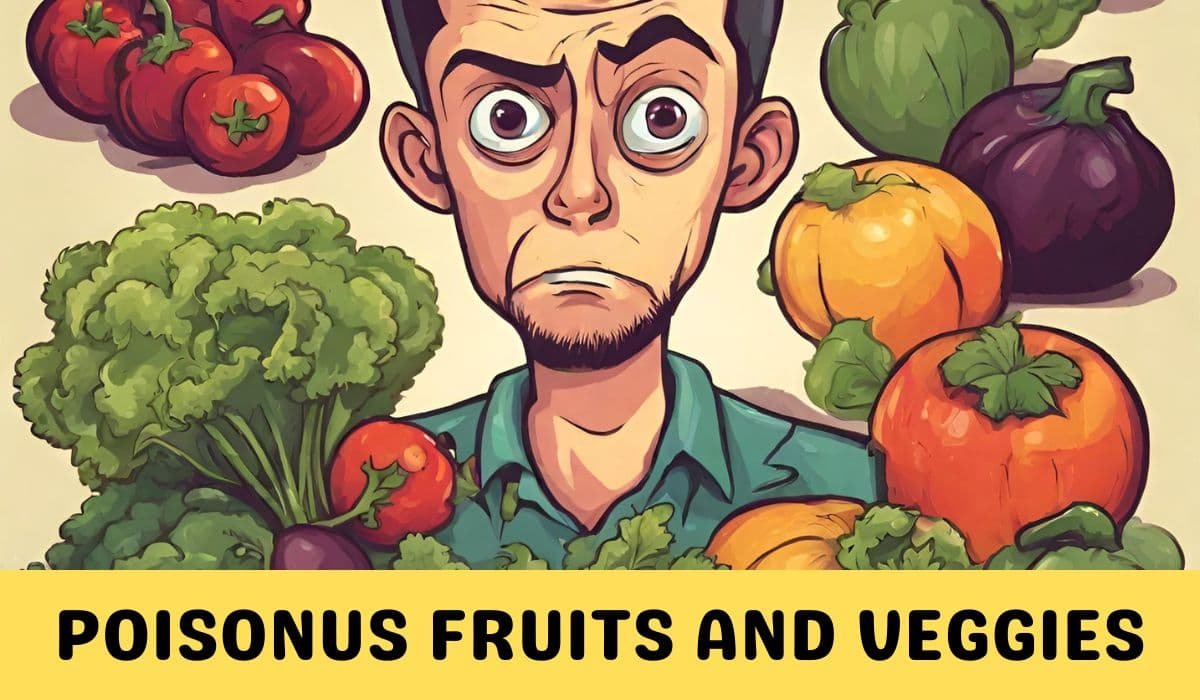
You’re about to discover a shocking truth: not all veggies are good for you. In fact, some can be downright deadly if eaten raw or certain parts are consumed.
In this guide, we’ll uncover 11 vegetable poisons – that is, 11 vegetables that harbor hidden dangers when eater raw or when you eat specific parts of them.
You’ll learn what they are, why they’re harmful, and how to safely enjoy them.
So, let’s dive into the unexpected world of vegetable poisons – it’s knowledge that could literally save your life.
12 Vegetable Poisons
You mightn’t be aware that some common vegetables can be harmful if consumed improperly.
For instance, apple seeds and stone-fruit pits, unripe lychee fruit, undercooked kidney beans, uncooked ackee, and the leaves or roots of tomatoes all contain toxins which can be harmful or even fatal in large amounts. It’s important to understand how to correctly prepare and consume these foods to avoid any potential health risks.
1. Apple seeds & stone-fruit pits
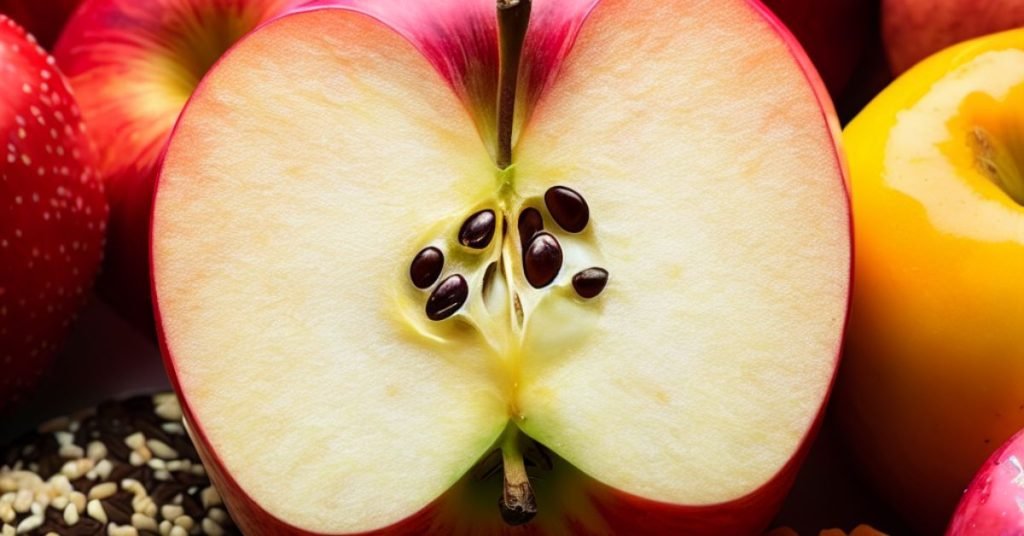
In spite of their harmless appearance, apple seeds and stone-fruit pits can pose a danger when you consume them, especially if they’re crushed or chewed before swallowing. These seeds and pits contain amygdalin, which transforms into toxic cyanide when mixed with stomach acid.
Fruits such as apricots, peaches, plums, and nectarines all carry pits with this bitter taste. This bitter flavor is nature’s way of deterring consumption by humans and animals. It’s generally safe to swallow a few apple seeds, but pulverized pits should be avoided.
A lethal cyanide dose ranges from 0.5 to 3.5 milligrams per kilogram of body weight. Thus, even a small apricot seed can be deadly for a toddler. [1]
2. Unripen Lychee fruit
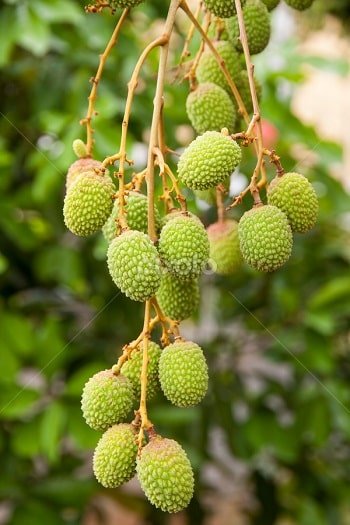
Beware of unripen lychee fruit, as it’s packed with toxins that can cause severe health issues when consumed. In its unripe state, lychee carries toxins that can drastically lower your blood sugar levels. This isn’t just a minor dip, it’s a dangerous plunge that can lead to life-threatening conditions.
In India, consumption of unripe lychees was even linked to a mystery disease affecting children. [2]
Symptoms ranged from fever to encephalopathy, a serious condition that affects brain function. What’s more, the risk is particularly high for those already dealing with low blood sugar or malnourishment.
3. Undercooked kidney beans
Kidney beans’ deceptive nature can turn your hearty meal into a health hazard if they’re undercooked. They contain a toxin, phytohaemagglutinin, which is particularly concentrated in raw red kidney beans. [3]
If consumed, this can cause nausea, diarrhea, and vomiting.
However, don’t fret. Cooking kidney beans thoroughly breaks down this harmful chemical, making them safe to eat.
Canned kidney beans are a good option as they’re pre-cooked, posing no health threat. But be cautious with dry kidney beans. They’re not toys and shouldn’t be handled by children.
In case you do ingest undercooked beans, the recovery from phytohaemagglutinin poisoning is usually quick. So, the key lesson is to always ensure your kidney beans are fully cooked.
4. Uncooked Ackee

Despite its status as Jamaica’s national fruit, you’ll want to think twice before munching on an ackee straight from the tree, due to its potential toxicity.
Unripe ackee contains hypoglycin, a toxin also found in lychee. This poison can be especially dangerous to children, who may not be aware of the risks. [4]
The toxin can lead to poisoning if the fruit is eaten before it’s ripe. It’s not common to eat it uncooked, and those who do consume ackee are typically well-informed about its toxicity.
5. Tomato leaves or roots
You might love a juicy tomato, but you’d be wise to steer clear of its leaves, stems and roots, as they contain a mildly toxic substance called tomatine. [5]
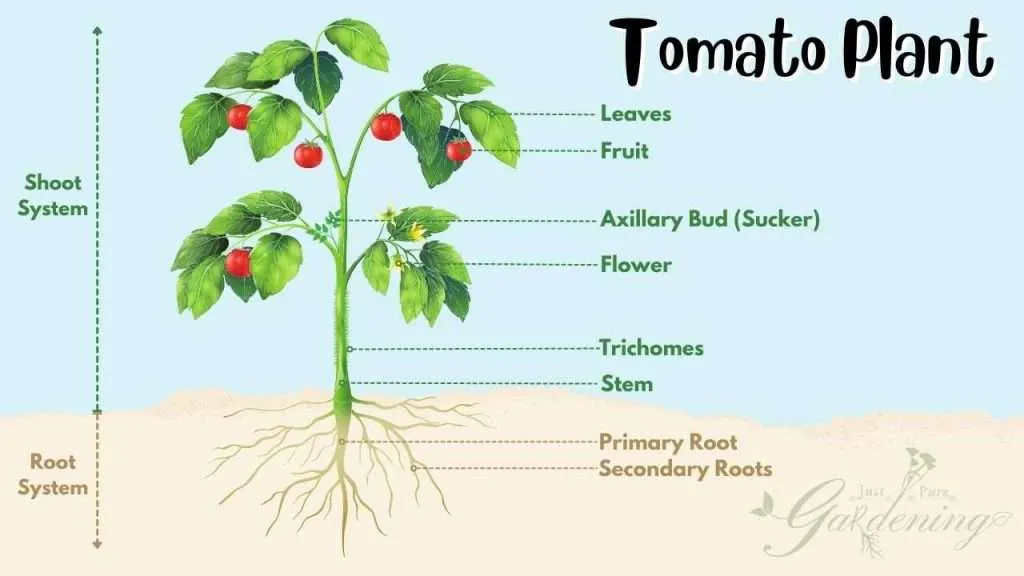
This alkaloid, found in higher concentrations in these parts of the tomato plant, can cause stomach upset if ingested in large quantities.
While humans can generally tolerate small amounts, it’s important to know that animals, especially dogs, are more susceptible to tomatine toxicity.
So, if you’re growing tomatoes at home and have pets, ensure that the plants are out of their reach.
6. Cassava
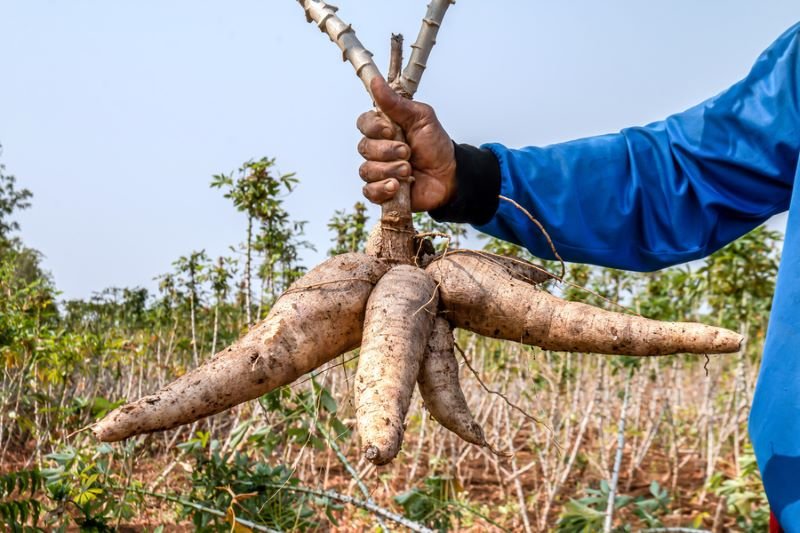
While cassava serves as a crucial food source for millions worldwide, it’s also one of the few vegetables that can release a potentially lethal poison if not processed correctly.
When mishandled, cassava can produce hydrogen cyanide, a compound that disturbs thyroid hormone production and affects brain functions related to movement. [6]
This vegetable’s potential toxicity is alarming, given its significant role as a staple food.
You should be aware that consuming this vegetable raw or poorly processed poses a serious health risk. Ingesting poorly processed cassava can result in irreversible paralysis, making it critical to follow proper preparation methods. [7]
Nevertheless, when correctly processed, cassava is safe to eat and provides a vital source of calories for many.
7. Sprouted potatoes

It’s important to note that sprouted potatoes can be harmful if eaten raw or improperly prepared due to the presence of solanine, a toxic alkaloid. [8]
This substance, concentrated in the sprouts, eyes, and skin of potatoes, can cause headaches, vomiting, and other digestive symptoms. [9]
Noticeably, greenish potatoes or those that have sprouted contain higher levels of solanine. Ingesting a significant amount could result in more serious effects such as hallucinations and paralysis.
Even though the skin does contain these compounds, you’d have to eat a lot of it to get sick. As a precaution, remove green potato skin before cooking.
Skin-on fries are generally safe because you’re consuming the skin in small amounts.
8. Starfruit (Carambola)
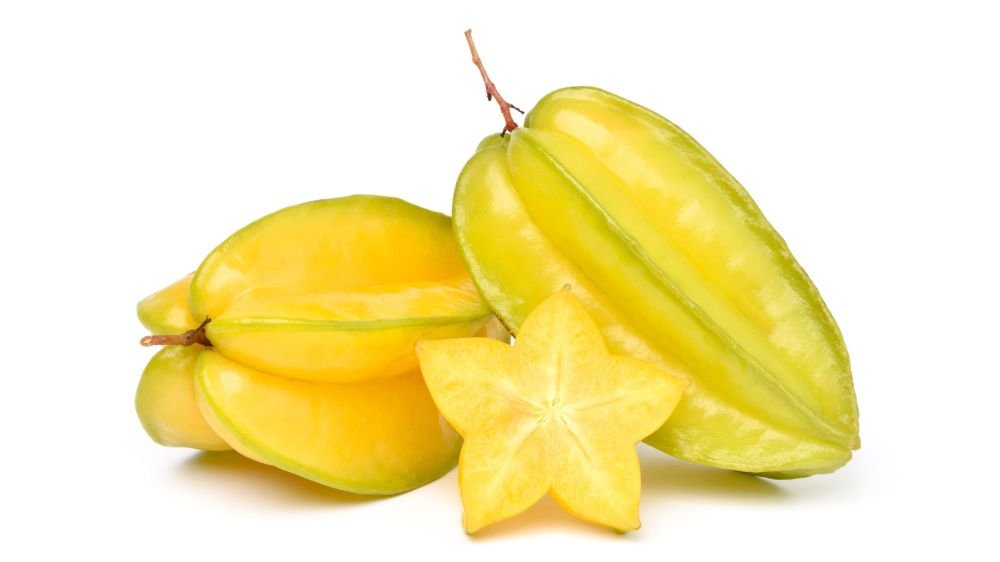
The starfruit might look harmless, but if you have kidney problems, this tropical treat can be deadly. It contains a neurotoxin called caramboxin. [10]
While people with healthy kidneys can handle this toxin without issues, for those with kidney disease, it’s a different story.
The toxin accumulates, leading to potential toxicity. This can manifest in a range of symptoms, from mild discomfort to seizures, and in worst-case scenarios, even death. Therefore, if you’re diagnosed with kidney disease, it’s essential to steer clear of starfruit.
Understanding the dangers that certain vegetables can pose, especially when eaten raw, is vital for maintaining your health. Remember, not every colorful delicacy in the produce aisle is as innocent as it seems.
9. Rhubarb leaves
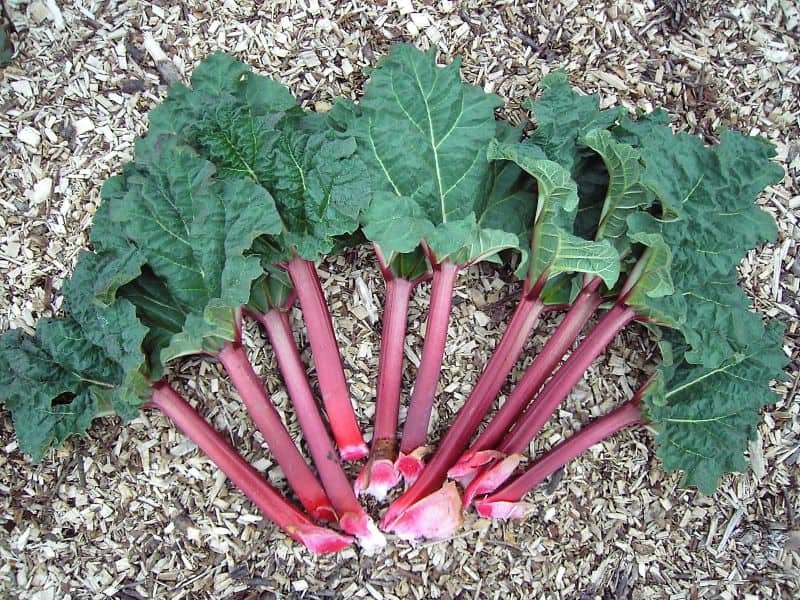
In the midst of your gardening, you might be tempted to snack on a raw rhubarb stalk, but beware of the leaves for they’re hiding a dangerous and poisonous secret.
Rhubarb leaves are high in oxalic acid, a substance that can lead to serious health issues like kidney stones or even kidney failure if consumed in large quantities over time.
It’s crucial to note, however, that you’d have to eat over 10 pounds of these leaves to feel the effects. Though oxalic acid is also present in lower amounts in other veggies like spinach, broccoli, cauliflower, and Brussels sprouts, it’s not enough to cause harm.
But when it comes to rhubarb, stick solely to the stalks and always discard the leaves.
10. Asparagus berries
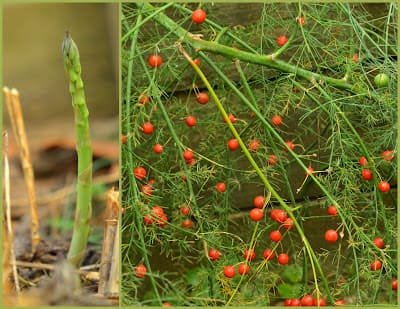
You’ve likely never encountered asparagus berries, yet if you do, beware, as these small red fruits carry a harmful steroid known to induce symptoms such as vomiting and stomach pain.
While the majority of us will never come across asparagus plants, for those who grow asparagus at home, this warning is pertinent. The berries, not the stems, are the culprits, with their potent toxins posing a risk especially to curious pets, like dogs.
It’s advisable to section off your asparagus plants to keep them out of harm’s way. However, the stems are perfectly safe and edible both for you and your furry friends.
11. Raw cashews
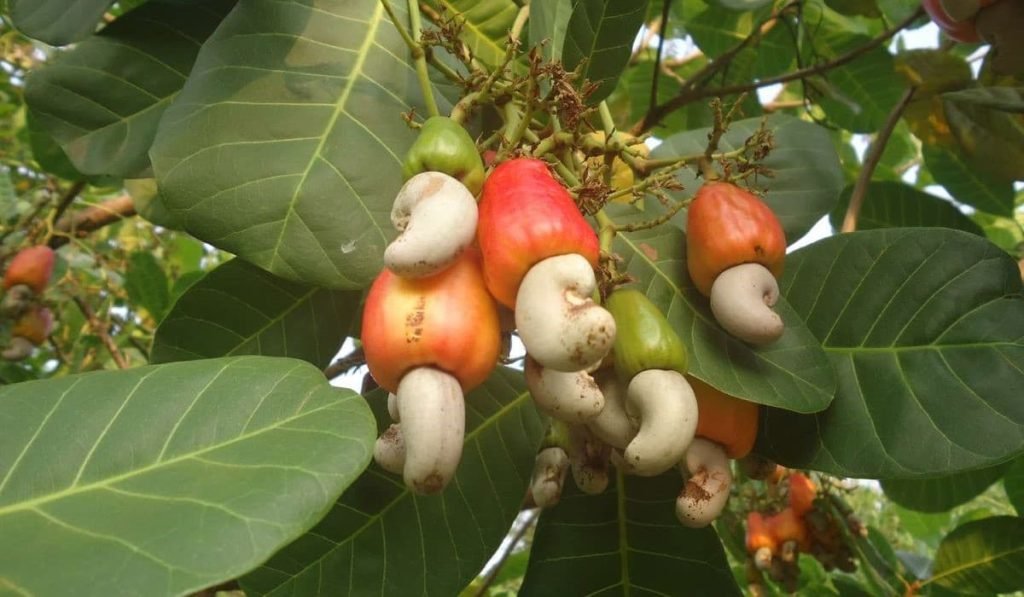
Beware when you’re munching on a handful of cashews, as those labeled ‘raw’ may contain a potentially harmful compound known as urushiol. This is the same compound that’s found in poison ivy. It can cause skin rashes and can be toxic when ingested.
However, don’t panic just yet. Commercial cashews that are labeled as ‘raw’ have actually been cooked to remove the shell, which makes them safe for consumption.
This cooking process eliminates the harmful urushiol, allowing you to enjoy your favorite cashew snacks without worry.
Remember, these ‘raw’ cashews haven’t been roasted or further processed, but they’re not truly raw in the sense of being straight from the tree.
Toxic Foods for Pets
Amid the hustle and bustle of keeping up with your pet’s health, it’s critical to be wary of what’s on their plate, particularly when it comes to vegetables that can be toxic for them.
While dogs can safely munch on carrots and apples, chocolate and grapes should be strictly off-limits.
For cats, organic cat food is recommended to minimize exposure to harmful ingredients. It’s also important to note that some fruits, often mistaken for vegetables like onions and garlic, are toxic to pets.
Uncommon Fruits and Vegetables
In your quest for culinary adventure, it’s important to note that some uncommon fruits and vegetables could be harmful if consumed raw or certain parts are eaten.
Take the star fruit or carambola, for example. While it’s a unique addition to your fruit bowl, consuming it in large quantities or when you have kidney problems could lead to toxicity.
Similarly, the jackfruit’s seeds shouldn’t be eaten raw due to the presence of harmful substances.
The durian, despite its growing popularity, contains high levels of potassium, which may prove dangerous for individuals with kidney issues.
It’s essential to research these exotic foods thoroughly before consumption.
Edible Plants in the Wild
You might be surprised by the abundance of edible plants in the wild, but before you start foraging, you’ll need to know how to identify them properly.
For instance, dandelions, purslane, and wild garlic aren’t only edible but also nutritious. However, they can easily be mistaken for harmful plants if you’re not careful.
When foraging, it’s crucial to be absolutely sure of a plant’s identity before consuming it. Misidentification can lead to serious health risks.
Furthermore, sustainable foraging practices are essential. This means not over-harvesting plants, as it can harm local ecosystems.
Pesticide Residues in Fruits and Vegetables
Despite diligently washing your fruits and vegetables, you’re still likely to ingest pesticide residues, and this is a concern you should be aware of.
Certain produce, like strawberries and spinach, often carry higher levels of these residues. We even wrote an article a while ago on the 12 Vegetables And Fruits With Most Pesticides And 15 Fruits And Vegetables With Least Pesticides.
You may want to check it out.
This is why the Environmental Working Group (EWG) releases an annual ‘Dirty Dozen’ list, spotlighting the worst offenders. To reduce your exposure to these harmful substances, choosing organic options can be a wise move.
Additionally, peeling your fruits and vegetables can also help to minimize residues – although this is somewhat controversial because many support that many nutrients are hidden in the peel of fruits and vegetables.
However, it’s crucial to note that the benefits of eating fruits and vegetables far outweigh the potential risks from pesticide exposure, especially if you’re taking steps to minimize it.
Frequently Asked Questions
Final Take
It’s vital to know which veggies can be harmful when eaten raw or have poisonous parts. Remember, what’s healthy for you may be toxic for your pets.
Uncommon fruits and vegetables have their own set of risks, as do wild plants, so always research, research, research before adding any fancy stuff to your plate.
Lastly, be mindful of pesticide residues. Your health is key, so always take the time to research and prepare your veggies correctly before you dig into your next meal.
Bacopa monnieri Tablets| Minimum 24% Bacosides
High quality, strong Bacopa Monnieri. Quantity per bottle: 120 or 240 servings. As a dietary supplement, take one 300mg Bacopa monnieri extract tablet 1-2 times daily.
Supports cognitive function, healthy sleep patterns, promotes healthy stress levels and feelings of well being.
⭐⭐⭐⭐⭐ | 4.8 (7 reviews)
Read Next


